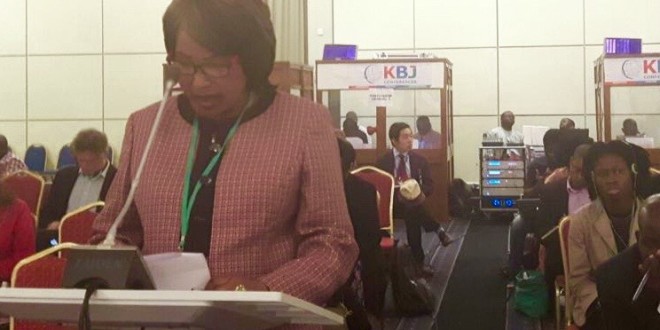58th Ordinary Session of the Africa Commission on Human and Peoples’ Rights
Banjul, The Gambia, 6-20 April 2016
Public Session Item 3: Human Rights Situation in Africa
Read by Angelina Seeka of End Impunity
Madame Chairperson, distinguished Commissioners, State Delegates, representatives of NHRIs and NGOs; all protocols respectfully observed.
This statement is delivered on behalf of the International Federation for Human Rights (FIDH), the African Centre for Justice and Peace Studies (ACJPS) and DefendDefenders (East and Horn of Africa Human Rights Defenders Project). Our organisations note that the lives of civilians in Sudan’s conflict areas of Darfur, Blue Nile, and South Kordofan continue to be marred by armed conflict, insecurity, and serious violations of international human rights and humanitarian law. Impunity for these abuses against civilians remains the norm.
South Kordofan and Blue Nile States
We would like to the draw the attention of the Honourable Commissioners to the situation in South Kordofan and Blue Nile States.
We recall that during the 51st Session, almost exactly four years ago on 18 April 2012, the African Commission noted the continuing humanitarian crisis in Darfur and the ongoing conflict in South Kordofan, prompting it to grant Provisional measures in respect of South Kordofan. We do not know whether the government of Sudan responded to the Commission’s provisional measures; however, since then the situation has worsened and civilians continue to endure an unrelenting campaign of aerial and ground attacks by the Sudanese Armed Forces.
Since the conflict between the Sudan Peoples’ Liberation Army – North and the Government of Sudan ignited in 2011, more than 1 million people have been forced to flee their homes. Government forces have attacked civilian areas and infrastructure through indiscriminate and targeted aerial bombardment and ground offensives, killing and maiming hundreds of civilians. Bombings and reconnaissance flights over civilian areas has had a profound psychological impact over the course of the conflict.
Reports from South Kordofan and Blue Nile States point to Sudanese Armed Forces’ deliberate targeting of civilian areas and objects, using imprecise weapons and delivery systems, without warning, and without legitimate military targets. Over four years, local monitoring groups have reported that government forces have dropped on average three bombs a day. This continued aerial bombardment of homes, health facilities, schools, crops, livestock and marketplaces has resulted in a dire humanitarian situation. Sudanese authorities continue to prevent humanitarian access to the region.
Human rights groups have documented mass arbitrary detentions and in some cases presumed enforced disappearances of civilians pursuant to attacks by government forces on civilian areas. Government forces and allied militia have also been implicated in alarming levels of sexual violence.
Darfur
We would also like to draw the attention of the Honourable Commissioners to the situation in Darfur where our organisations and others have documented the forced displacement of entire communities. In 2015 the UN Panel of Experts on Sudan characterized the Government strategy in Darfur as one of “collective punishment” and “induced or forced displacement” of communities from which the armed opposition groups are believed to come or operate. Arbitrary detention, torture and extra-judicial killing cases continue to be documented. Government forces have also proven unwilling or unable to protect civilians in the context of a surge in inter-communal violence in Darfur, and in some cases have participated in the fighting.
Last year, levels of violence in Darfur were reported to be at their highest level since 2004, accompanied by an “especially high” number of killings. The Rapid Support Forces, a paramilitary government force under the command of the National Intelligence and Security Service (NISS), has led a number of brutal counterinsurgency campaigns against civilian populations since its creation in 2013, with the support of other government forces.
In early January 2016 the African Centre for Justice and Peace Studies (ACJPS) documented the lethal shooting of at least ten civilians, including two children, by police and security personnel in El Geneina, West Darfur, following the burning and looting of the nearby village of Mouli by suspected members of the Rapid Support Forces.
Impunity
The government of Sudan has repeatedly failed to ensure prompt, impartial and effective investigations into allegations of attacks on civilians in Sudan’s conflict zones. Members of the NISS, police and Sudan’s Armed Forces (SAF) are protected from prosecution by immunities under Sudanese law. In its August 2015 report on Darfur the UN Office of the High Commissioner on Human Rights found that Sudan’s criminal justice system had failed to have a meaningful impact in combatting impunity and strengthening accountability in that region.
We urge the African Commission to call on the Government of Sudan to:
- Ensure that forces under State control immediately end all deliberate and indiscriminate attacks against civilians in Darfur, South Kordofan and Blue Nile states, and hold suspected perpetrators of international humanitarian and human rights law to account by waiving their immunities and ordering full and impartial investigations into their conduct;
- Grant full access for humanitarian aid to all populations in need, and comply with existing agreements regarding the operation of aid agencies in Sudan, including the commitment to allow aid organizations to implement human rights and protection programs.
- Fully cooperate with UNAMID in Darfur, including by facilitating its full and unfettered access to all parts of Darfur, and ensure that the mission can carry out its mandate to protect civilians freely and without hindrance.
 African Centre for Justice and Peace Studies ACJPS | المركز الافريقي لدراسات العدالة و السلام
African Centre for Justice and Peace Studies ACJPS | المركز الافريقي لدراسات العدالة و السلام




